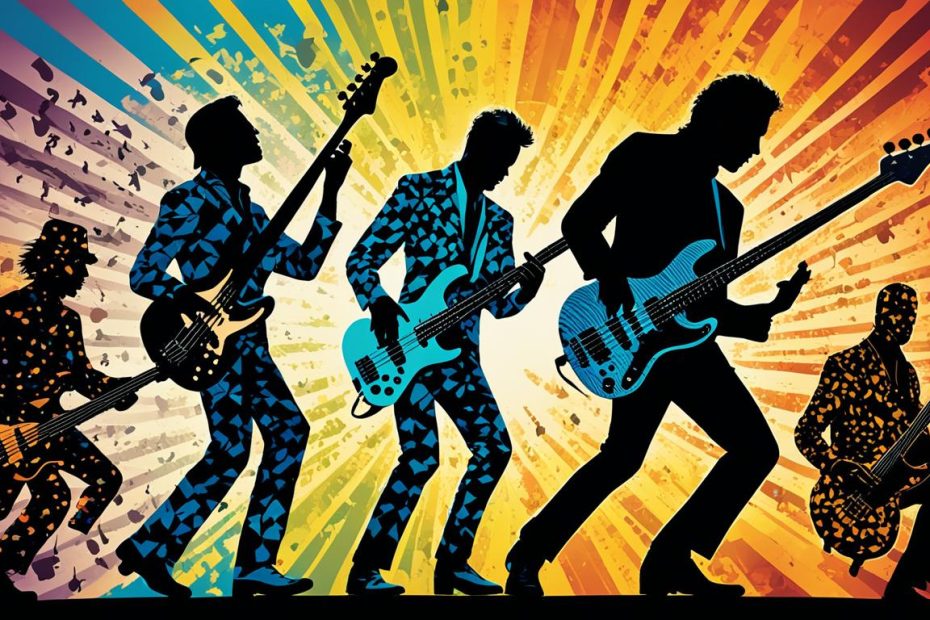Bassists often play a crucial role in creating the foundation of a song, yet they are often overlooked and undervalued in bands. However, there have been numerous legendary bass guitarists who have left an indelible mark on the music industry. From session legends like Carol Kaye and James Jamerson to rock warriors like Jack Bruce and John Entwistle, and fusion gods like Stanley Clarke and Jaco Pastorius, these iconic bass players have influenced generations of musicians with their groundbreaking work.
In this article, I will explore the lives and artistry of the most influential bassists who have electrified stages worldwide. Join me as we delve into the world of legendary bass guitarists and discover the stories behind their iconic music.
Key Takeaways:
- Legendary bass guitarists have made significant contributions to the music industry.
- Bassists like Carol Kaye, James Jamerson, Jack Bruce, and John Entwistle have influenced generations of musicians.
- Stanley Clarke and Jaco Pastorius are revered as fusion gods for their groundbreaking work.
- Join us as we explore the lives and artistry of these iconic bass players.
Thundercat: The Modern Bass Icon
Thundercat, born Stephen Bruner, has emerged as one of the most prominent bassists in recent years. With his virtuosic and diverse style, he has captivated audiences and fellow musicians alike.
Thundercat’s exceptional talent can be heard on records by acclaimed artists such as Kendrick Lamar, Janelle Monáe, and Flying Lotus. His bass playing adds dimension and depth to their music, showcasing his remarkable skill as a bassist.
What sets Thundercat apart is his ability to seamlessly blend genres and influences. With a deep love for funk and fusion, he infuses his playing with a unique combination of grooves and melodic lines. The result is a sound that is both captivating and unmistakably Thundercat.
“I don’t really approach playing the bass like ‘I’m gonna do some virtuosic bass playing.’ If the song calls it, I’m definitely gonna do it, but for the most part, I just like envisioning the melody.”
Thundercat’s six-string sound stands out with its fat, buttery tone and biting edge. He pushes the boundaries of what the bass can do, exploring new techniques and creating innovative bass lines.

Thundercat’s influence as a modern bass icon cannot be overstated. Through his virtuosity and diverse influences, he has inspired countless bassists and musicians to push their own boundaries and explore new possibilities.
Duff McKagan: From Punk to Rock Legend
Duff McKagan, best known as the bassist for Guns N’ Roses, had a unique journey to becoming a legendary bass guitarist. Starting as an ex-guitarist and ex-drummer in the punk scene, McKagan brought a raw approach to his bass playing, which added a rough edge to Guns N’ Roses’ sound.
Inspired by diverse bassists like John Paul Jones and Barry Adamson, McKagan developed his own style, characterized by chording, two-handed tapping, and controlled feedback. His contribution to the band’s sound made him an integral part of rock music in the 80s and 90s.
Influences and Evolution
Moving from punk to rock, Duff McKagan took inspiration from various bassists who influenced his playing style. From John Paul Jones’ melodic bass lines in Led Zeppelin to Barry Adamson’s atmospheric approach with Magazine, McKagan crafted his own unique sound.
“I was never interested in just being a traditional bass player. I wanted to push the boundaries and experiment with different techniques to create something fresh and exciting,” said McKagan.
His experimentation with chording, two-handed tapping, and controlled feedback allowed him to stand out from other bassists of his time. McKagan’s raw and aggressive approach to bass playing added a new dimension to Guns N’ Roses’ music.
Guns N’ Roses: An Unforgettable Legacy
Joining Guns N’ Roses in 1985, Duff McKagan became an essential part of the band’s success. His raw bass lines provided a strong backbone, driving the band’s energetic performances and contributing to their iconic sound.
McKagan’s bass playing is particularly notable in songs like “Sweet Child o’ Mine” and “Paradise City,” where his distinctive style elevates the songs to a new level. The combination of his raw approach and technical prowess made him a force to be reckoned with.
“My bass playing isn’t about showing off. It’s about serving the music and creating a powerful foundation for the band.”
Despite his success with Guns N’ Roses, McKagan’s impact on the rock music scene extends beyond the band. He has collaborated with various artists and pursued solo projects, showcasing his versatility as a bassist.
Duff McKagan’s contributions to the world of music, his raw approach to bass playing, and his influential role in shaping Guns N’ Roses’ sound have solidified his status as a rock legend.

Kim Deal: The Element of Simplicity
Kim Deal, known for her influential bass playing with the Pixies, has made a lasting impact on the alternative music scene. What sets Deal apart is her ability to create simplistic bass lines that form a strong foundation for the Pixies’ songs.
Whether it’s the throbbing bass part in “Gigantic” or the pulsating rhythm in “Debaser,” Deal’s contribution propels the band’s unique sound. Her approach to the bass is characterized by minimalism, avoiding unnecessary flash and showcasing the power of simplicity.
Deal’s simplistic bass lines have influenced many bassists who value the art of restraint and the ability to make a big impact with fewer notes. Her melodic yet straightforward style continues to resonate with fans and aspiring musicians alike.
Kim Deal’s innovative bass playing with the Pixies has firmly established her as an influential bassist in the music industry, leaving an indelible mark on the alternative genre.

Leland Sklar: The Master of Melodic Bass
In the world of session musicians, Leland Sklar is a name that stands out. His melodic bass lines and understated style have made him one of the most sought-after bassists in the industry. Working with esteemed artists like James Taylor, Jackson Browne, and Phil Collins, Sklar has left an indelible mark on countless classic records.
What sets Sklar apart is his ability to craft memorable bass lines without overshadowing the song. His melodic sensibility adds depth and emotion to the music, enhancing the overall listening experience. Sklar’s bass playing is the backbone of many iconic tracks, providing the foundation for the melodies and rhythms to flourish.
Unlike bassists who showcase flashy techniques, Sklar’s approach is all about serving the song. He understands the importance of subtlety and restraint, allowing the music to breathe. This understated style has gained him the respect and admiration of both musicians and fans alike.
“When I listen to a song, I try to feel what the composer was feeling at the time. Then, I’ll try to create a part that contributes to the emotion of the song.”
While Sklar may not be a household name, his contributions to the music industry have solidified his status as a legendary bass guitarist. His melodic bass lines have touched the hearts of millions, and his influence continues to inspire aspiring bassists around the world.

Selected Discography:
| Artist | Album | Year |
|---|---|---|
| James Taylor | Sweet Baby James | 1970 |
| Jackson Browne | Running on Empty | 1977 |
| Phil Collins | No Jacket Required | 1985 |
| Toto | Toto IV | 1982 |
Through his remarkable career, Leland Sklar has demonstrated the power of melodic bass and the importance of putting the song first. His masterful playing continues to inspire a generation of bassists and reminds us that sometimes, it’s the subtle touches that make all the difference.
Peter Hook: The Groove Master of Postpunk
Peter Hook is a legendary bassist known for his influential work with Joy Division and New Order. With his distinctive bass tone and signature melodic pulse, Hook redefined the role of the bass in postpunk music, leaving an indelible mark on the genre.
Hook’s bass lines in songs like “She’s Lost Control” and “Age of Consent” became the blueprint for countless bassists. His willingness to experiment with playing high on the neck and manipulate the tone of his instrument set him apart as a true groove master.
Even decades after his groundbreaking work, Hook’s influence can still be heard in the music of today. His innovative approach to bass playing continues to inspire aspiring bassists, ensuring that his legacy as a postpunk pioneer remains strong.
| Song | Band | Year |
|---|---|---|
| “She’s Lost Control” | Joy Division | 1979 |
| “Age of Consent” | New Order | 1983 |
Esperanza Spalding: Pushing the Boundaries of Bass
When it comes to jazz bassists, Esperanza Spalding stands out as a true trailblazer. Her versatility and progressive style have revolutionized the way we perceive the bass as an instrument. With her seamless blend of genres like jazz, R&B, and pop, Spalding has carved her own unique identity in the music industry.
Spalding’s virtuosic bass playing serves as the driving force behind her captivating performances. Whether she’s crooning old-school jazz standards or delivering her own original compositions, her talent shines through with every note she plays.
“I think the job of an artist is to take something, make it your own, and then give it back.”
– Esperanza Spalding
Spalding’s ability to venture beyond the boundaries of traditional jazz bass playing has earned her a place among the ranks of legendary bass guitarists. Her progressive style pushes the limits of what the instrument is capable of, inspiring aspiring musicians and seasoned professionals alike.
Conclusion
The world of bass guitarists is brimming with legendary players who have made significant contributions to the music industry. Each bassist, from Thundercat with his modern approach to Duff McKagan’s raw rock sound, has left an influential legacy that resonates with music lovers worldwide.
Kim Deal’s minimalist style and Peter Hook’s groove mastery have shaped the evolution of bass playing, inspiring generations of aspiring musicians. Meanwhile, Esperanza Spalding continues to push the boundaries of what the bass can achieve, solidifying herself as one of the most innovative bassists of our time.
Through their groundbreaking work and exceptional talent, these legendary bass guitarists have cemented their places in music history. Their unforgettable melodies and undeniable impact on the industry will continue to inspire future generations of bass players, ensuring their influential legacies live on.
FAQ
Who are some legendary bass guitarists?
Some legendary bass guitarists include Thundercat, Duff McKagan, Kim Deal, Leland Sklar, Peter Hook, and Esperanza Spalding.
What makes Thundercat a modern bass icon?
Thundercat is known for his virtuosic and diverse style, which can be heard on records by Kendrick Lamar, Janelle Monáe, Flying Lotus, and more. His fat, buttery tone and biting edge set him apart.
How did Duff McKagan become a rock legend?
Duff McKagan had a unique journey, starting as an ex-guitarist and ex-drummer in the punk scene. Inspired by diverse bassists like John Paul Jones and Barry Adamson, McKagan developed his own style characterized by chording, two-handed tapping, and controlled feedback.
What is Kim Deal known for?
Kim Deal is known for her bass playing with the Pixies, where her simplicity and lack of needless flash provided a strong foundation for the band’s unique sound. Her minimalist approach has influenced many bassists who value the power of simplicity.
What makes Leland Sklar a master of melodic bass?
Leland Sklar is respected as a session bassist due to his melodic and nonflashy playing. His ability to craft memorable bass lines without overpowering the song has made him sought after by renowned artists such as James Taylor, Jackson Browne, and Phil Collins.
What sets Peter Hook apart as a groove master?
Peter Hook redefined the role of the bass in postpunk music with his distinctive bass tone and melodic pulse. His willingness to play high on the neck and experiment with his instrument’s tone made him stand out, and his influence can still be heard today.
How does Esperanza Spalding push the boundaries of bass?
Esperanza Spalding is a jazz bassist who blends genres like jazz, R&B, and pop, showcasing her versatility and progressive style. Her virtuosic bass playing drives her captivating performances, solidifying her as one of the most innovative bassists of our time.
What is the conclusion of this article?
The world of bass guitarists is filled with countless legendary players who have made significant contributions to the music industry. Each bassist mentioned in this article has left an influential legacy, shaping the evolution of bass playing and cementing their places in music history.
Source Links
- https://www.udiscovermusic.com/stories/best-bassists-in-music/
- https://www.rollingstone.com/music/music-lists/50-greatest-bassists-of-all-time-1003022/
- https://www.jazzguitar.be/forum/players/86959-who-worlds-greatest-bass-player.html

Bass Punch
Bass Punch is curated by a group of passionate guitarists and bassists, offering a wealth of informational content. This collective of experts shares their insights, techniques, and knowledge with readers, aiming to educate and inspire enthusiasts across all levels of proficiency. The blog serves as a hub for those seeking to deepen their understanding of bass and guitar, providing valuable resources and guidance from seasoned professionals in the field.
